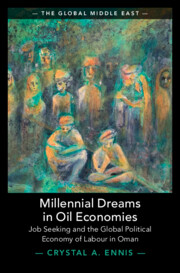Book contents
- Millennial Dreams in Oil Economies
- The Global Middle East
- Millennial Dreams in Oil Economies
- Copyright page
- Contents
- Figures
- Maps
- Tables
- Preface
- Acknowledgements
- A Note on Transliteration
- Abbreviations
- Maps
- 1 Bringing Citizen Labour into IPE Scholarship on the Gulf
- 2 Making Global Labour Markets and National Dreams
- 3 Rereading Omani Work History and Labour Market Governance
- 4 Promising Dubai in Sohar
- 5 Constructing Belonging and Contesting Economic Space
- 6 Pursuing Entrepreneurship for Employment
- Conclusion
- Bibliography
- Index
Conclusion
Studying the Global Political Economy of Labour
Published online by Cambridge University Press: 02 January 2025
- Millennial Dreams in Oil Economies
- The Global Middle East
- Millennial Dreams in Oil Economies
- Copyright page
- Contents
- Figures
- Maps
- Tables
- Preface
- Acknowledgements
- A Note on Transliteration
- Abbreviations
- Maps
- 1 Bringing Citizen Labour into IPE Scholarship on the Gulf
- 2 Making Global Labour Markets and National Dreams
- 3 Rereading Omani Work History and Labour Market Governance
- 4 Promising Dubai in Sohar
- 5 Constructing Belonging and Contesting Economic Space
- 6 Pursuing Entrepreneurship for Employment
- Conclusion
- Bibliography
- Index
Summary
This chapter offers concluding reflections, taking readers through three intersecting vectors that run through the book. The first establishes how the segmented labour markets of the region are embedded within global structures and processes, which in turn shape domestic and regional structures and the frames through which social relations and regulations unfold. The second vector suggests three historical junctures as especially important in shaping labour trajectories in the region: (1) the partial incorporation of Omani labour and transnational Asian labouring classes into global capitalism through colonial development; (2) the wider integration of Gulf economies and labour markets into global capitalism through the expansion of the oil industry; and (3) the increasing embeddedness of the region in neoliberal capitalism. Finally, the third vector explains the liberalising and nationalising dialectic in labour governance The heterodox approach of the book offers a direction for future scholarship on the GPE of labour, demonstrating both how empirically-grounded national and regional case studies can highlight and explain global patterns, as well as how the present and future of work in local spaces are entangled within the trajectories of global capitalist development.
Keywords
- Type
- Chapter
- Information
- Millennial Dreams in Oil EconomiesJob Seeking and the Global Political Economy of Labour in Oman, pp. 282 - 289Publisher: Cambridge University PressPrint publication year: 2025

